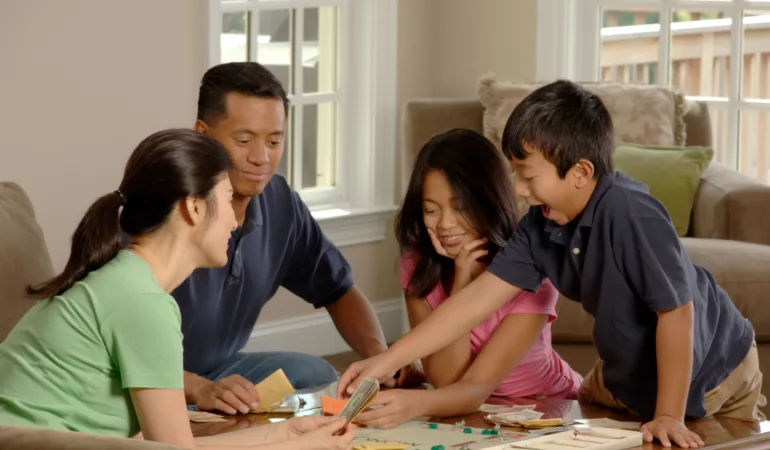Planning for Success with ADHD at Home: ADHD Strategies for Children
It is possible to have more fun with your child and experience less frustration, even if your child has ADHD. You may feel like all you do right now is remind or nag your child to brush their teeth, complete homework, get ready in the morning, and not fight with siblings. You have tried the strategies that worked with your other kids or have worked for your friends, but with no success. If your child has traits of ADHD or has been diagnosed with ADHD, this probably sounds very familiar. This blog can help you learn ADHD strategies for children that you can utilize to help your child successfully complete tasks such as school assignments, chores, and self-care.
ADHD Strategies for Children at Home
Many parents of kids with ADHD struggle to get their children to complete tasks at home. Your child may need more support than other children their age to be able to be successful at homework, chores or even maintaining hygiene.
Thankfully, there are a few strategies that will help you and your child navigate the challenges. These strategies can be used by all parents, but are especially important for parents of a child with ADHD. You may have to provide more consistency and structure in your parenting to support the different ways your child’s brain works.
1) Prioritize
When tackling challenges at home, it is important to start small. You have a thousand things you want your child to do and they all are important. Focus on the most important task first. Select 1-3 things and become highly consistent in prioritizing them until they become a habit for your child. Then, you will know it is time to move on to the next thing on your list.
While this can be challenging, it is key for success.
Remember, you will have to ignore some important things as you focus on your goals. However, doing so will be more effective. It will help your child make progress with one task before moving on to the next.
Prioritizing is especially important for children with ADHD, because they already experience difficulty remembering what needs to be done. Fewer things to remember equals more success.
So, what is the one task you want to focus on right now?
2) Create a Plan
Now that you have prioritized, create a plan with your child. If your child has ADHD, then you may need to be more explicit when creating a plan to enhance their ability to remember the plan.
Your plan should include a very clear description of your expectations for your child. It also needs to include description of what you are going to do to help them. Create a plan in collaboration with your child. This will grant the opportunity for them to express what is difficult for them and what they need from you in order to succeed. Keep in mind, you may have to adjust your expectations so that the plan works for both of you.
3) Rewards
Rewards can be far more powerful for changing behavior over time than punishments. However, they can be difficult to implement.
Identify what your child can earn if they complete the task you expect this week. Maybe it is a later bedtime, additional screen time, or the selection of your family dinner or the Friday night movie. Think of things that can be repeated, are doable, and do not break the bank. Create a menu so that your child can choose which reward they want: whatever best incentivizes them from your pre-approved list.
Rewards are effective for all children, but may be more necessary for children with ADHD. They tend to be more bored by routine tasks less likely to feel naturally rewarded by completing a task they need to do. Attaching an external reward can make the task seem feel interesting or worthwhile.
4) Praise
Praise more than you think you need to. This is so important for children with ADHD because they may often feel like a failure. Praise serves as an incentive for them to repeat appropriate behavior. It also helps boost their self-esteem.
Even if something is not perfect, praise them for the little progress you observe every week.
5) Reminders
Get creative with these! Because the ADHD brain works differently, reminders are crucial. Keep in mind, they need to be consistent with your child’s interests or strengths. You can try charts, phone alarms, visual reminders, and scheduling a check in with you, so that you can remind them about the plan and praise any progress. Choose a reminder system that works best for your child based on their age and preferences.
6) Consistency is Key
It takes times to form healthy habits and may be harder for your child with ADHD. If they are forgetful or uninterested, it can take a while to figure out what they need and create a habit.
7) Get Help with ADHD Testing in Los Angeles
Even the best parents need help! These ADHD strategies for children may sound easy. However, they can be challenging for children with ADHD to accomplish consistently. That’s why identifying and developing a strategy that works best for your child’s unique needs is so important. Every child with ADHD has different needs, strengths, and interests. It may be helpful to work with a psychologist to identify the strategies that will work best for your child. ADHD testing can also help clarify how your child’s brain works, as well as identifying their strengths and weakness.
If you are wondering if your child has ADHD and would like more information about therapy or testing, you can set up a free consultation to discuss your assessment and/or therapeutic needs.














